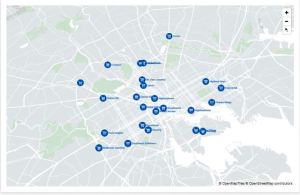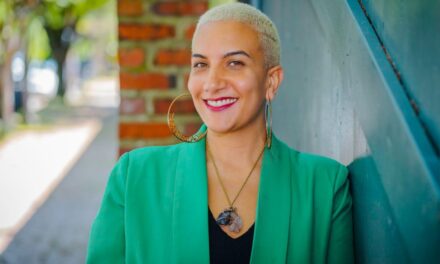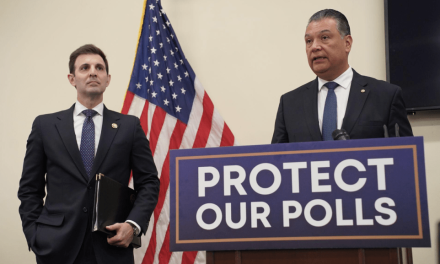
By Maya Pottiger
Special to the AFRO
Allen AME pastor, the Rev. Brenda White was walking through the neighborhood one day when someone stopped her, saying, “Pastor, the birds are back.”
Confused by the statement, she repeated, “The birds are back?”
“You put in the garden,” the person explained. “The garden brought the bees, the butterflies, the birds. In this community, you couldn’t see birds.”
Then Rev. White understood: “They recognized that a change has come.”
The Black Church Food Security Network
The garden is one of 70 around the country working together in the Black Church Food Security Network, and about 10% of those are located in Baltimore. The network was started in 2015 by the Rev. Heber Brown, who was concerned with the city’s abundance of “access without agency.”
“When you look at the current food environment for Black folks in Baltimore, you’re looking at a picture where the Black community was not an architect in putting these pieces in place,” Rev. Brown said. “Black people did not design this. We did not have the voice, agency or power to design our neighborhoods and plan them in such a way to foster optimal health by being in close proximity and having ownership of our food outlets.”
So he started the network. The goal is to give Baltimore’s Black community more health, wealth and power. Rev. Brown began organizing learning opportunities, inviting Black farmers and truck drivers to speak with the community — first in person, then virtually — to help them learn about farming: soil types, native plants, what produce can grow in which environments.
“We think it’s important for our congregation members to know the farmers and not have a transactional relationship but a truly transformative one,” he said.
The Gardens
There are currently more than 10 churches involved around the city, all at different stages of the process. Some are still setting up their gardens, while others have been growing produce for several seasons.
At Allen AME, the garden is named Pathway Forward after the church’s nonprofit arm. The garden has extended raised beds so people don’t have to bend down to pick the produce. Pathway Forward grew watermelons, cucumbers, herbs, tomatoes, peppers, and lettuce. Many people made summer salads, somebody made homemade hot sauce, White said, and the community couldn’t believe how long the produce lasted.
A few miles north, Northside Baptist Church went through trial and error with their garden, switching out eggplant for more popular options, like mint and tomatoes. This is the church’s second attempt at a garden. After its successful 2017 season, there weren’t enough volunteers to maintain the garden in 2018 or 2019. Then new seeds were planted in 2020.
“It was borne out of the isolation we knew people were feeling,” the Rev. Walter Parrish said. “We didn’t know what it was safe for us to do or how engaged we could be outside, but it was an opportunity to do something instead of sitting home and listening to the news.”
The garden also helped teach the community an important lesson: anything worthwhile requires constant attention. During Baltimore summers, the garden needed to be watered by 11 every morning, which involved dragging 300 heavy feet of hose uphill. Then a determined volunteer figured out how to plant spikes in the ground that held the hose in place out of the way of the landscaping crew.
It all goes back to what congregants say during worship: “Northside Baptist Church is intentional about making and growing disciples, and empowering people to live changed lives.”
The Motivation
The two churches’ neighborhoods are considered food deserts, or an area that has limited access to food that is both affordable and nutritional.
In addition to not having any full-sized grocery stores within walking distance, White said her neighborhood has a “ridiculously low” per capita income and is among the lowest in car ownership in the city. On top of that, she described the bus system as “horrible for the community.”
“It’s the perfect storm of what could go wrong, and here comes Pathway Forward and said, ‘Let’s have a spark of hope,’” Rev. White said.
Parrish’s community faces similar problems, which was one of his main motivators for starting the garden.
“Generally, if they live in our immediate area, the closest grocery store is about a mile and a half away,” Parrish said. “That’s a long way to go if one does not have one’s own transportation and one is trying to live healthy.”
The Future
The Network is constantly growing, and is currently comprised of more than 50 congregations throughout the Mid-Atlantic, Rev. Brown said, as it became a nationwide network during the pandemic.
Rev. Parrish highlighted the importance of working together, saying they can accomplish more as a team than any individual could do alone.
“Being part of the network has given us connectivity, but also a real clarity about being part of something that’s bigger than just the garden at Northside Baptist Church,” Rev. Parrish said. “We are part of a network of individuals who are striving to make the best use of this earth that God has given us and what it can do to help feed people naturally.”
Going forward, he hopes that people will understand that you don’t “have to start with big things,” and that even the smallest things make a difference. Similarly, Rev. White hopes to see every church with its own property consider a garden.
“Even if you have asphalt on a parking lot, designate somewhere, some place that you can put up the raised beds. Grow something that people can eat,” Rev. White said. “This can be duplicated all over Baltimore city and be self-sustained.”
Help us Continue to tell OUR Story and join the AFRO family as a member – subscribers are now members! Join here!
The post #SecuringTheBag: Churches supplant food deserts with neighborhood gardens appeared first on AFRO American Newspapers .











